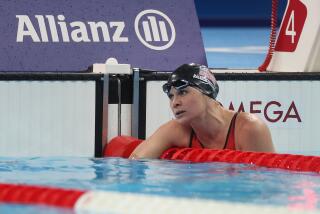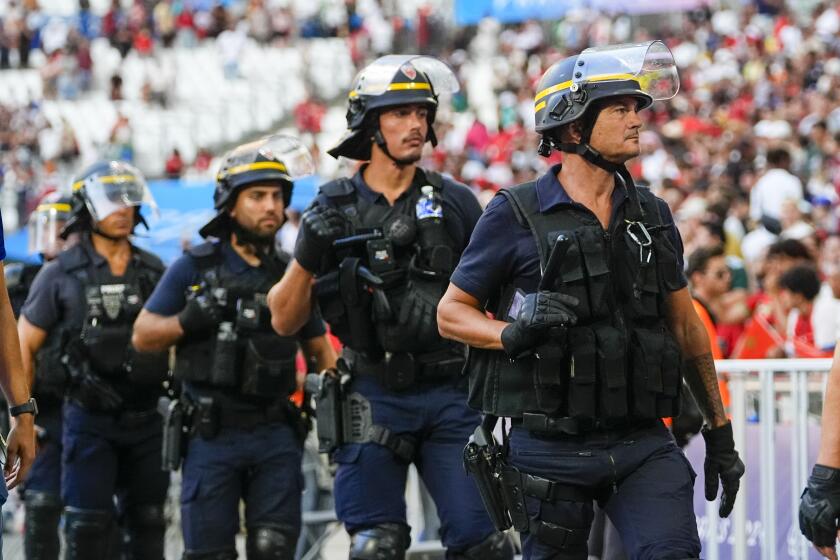Cyclist Sarah Hammer gets second wind after bad Beijing experience
Sarah Hammer has a beautiful smile.
That smile was hidden at the Beijing Olympics, behind one of the masks Hammer and three of her track cycling teammates wore as they got off their arrival flight, the athletes having taken advice that it was best to filter the city’s polluted air.
The four cyclists eventually were put in an apologetic news conference, where they told the world they were sorry for doing what they thought had been best for their health.
The masks they wore had been issued by the United States Olympic Committee, and it was the USOC that made them publicly apologize for wearing them.
And then it was as if Hammer competed apologetically. Instead of producing the performances that had earned her world championships before the Olympics, she left Beijing without a medal but with a broken collarbone.
She finished fifth in her signature event, the individual pursuit, and was injured in a collision that knocked her out of the points race.
“It wasn’t my best experience overall,” Hammer says in an understatement.
A month after the Olympics ended, Hammer and the other cyclists who wore the masks —Jennie Reed, Bobby Lea and Mike Friedman — received apologies of their own from the USOC. Too little too late, according to Andy Sparks, Hammer’s coach and husband.
“They embarrassed those athletes for doing what they had suggested,” Sparks said, “and really helped ruin the Olympics for their own athletes.”
Shortly after Beijing, the International Cycling Union (UCI) decreed that the individual pursuit, the race in which Hammer holds the world record, would no longer be an Olympic event.
It has been replaced by the “omnium,” a two-day, six-event test that includes 250-meter sprints and a 20-kilometer points race, tests of both speed and endurance.
Rather than sulk over the public shaming in Beijing followed by the loss of her favorite event, Hammer has embraced the challenge of learning new things.
In the last six months, she has won the omnium at the Olympic test event on the track in London, won bronze at the world championships in Australia and stamped herself as the best medal prospect for the U.S. track cycling team.
“They took my specialty event and did a complete reshuffling, which is not ideal, but I quickly moved on,” she said. “And maybe it’s been good to refocus on something new. Everything evolves, and so do I.”
Hammer, 28, lives in Temecula when she’s in the U.S. But she and Sparks have lived for much of the last four years in Switzerland, where Sparks was hired as the UCI’s chief development coach.
The move provided Hammer with a more positive outlook on herself and her sport, she said.
“I really enjoyed training with the young riders,” Hammer said. “That was one of the biggest things that helped re-motivate me after Beijing. They gave me a new, fresh perspective. They looked up to me and my accomplishments. It was just a great experience being around people from all over the world.”
In that time, Sparks developed a new training program for Hammer, who is a four-time world champion and 20-time national champion. What she had done to become an individual pursuit world champion would not suit her goal of winning an Olympic medal in the omnium.
“The biggest change is working on sprint events,” Hammer said. “Before, I was training completely for endurance. The omnium has two sprint events so I had to do a whole makeover. I needed to get back in the gym and get strong, train myself to be fast again.”
The individual pursuit was more of an endurance test, Sparks said, one that suited Hammer’s subdued personality.
The sprints, including something called the flying lap in which the last racer after every two laps is eliminated, seem more suited to aggressive competitors.
The Hammer the world saw in Beijing was anything but aggressive.
She was not at her physical best, still recovering from a back problem she had in 2007, and the public issue of the mask broke her spirit.
“I wouldn’t change anything that I did,” Hammer said, “but it taught me a lot. It taught me who really is behind you and how much family and friends matter. . . . I went through those Olympics in a state of numbness, I guess is the best way to describe it. And that’s not a good way to compete at an Olympics.”
Sparks said he was devastated in 2008.
“My goal as a coach is to always absorb stress so the athletes don’t have to be subjected to it,” he said. “We try to plan everything to the perfect degree to give the athletes the best possible platform, and what happened in Beijing was the polar opposite. It was pretty much the worst-case scenario. But what the athletes did was only what the United States Olympic Committee had recommended.
“But it’s been a huge growing experience for Sarah, going through hell and making it out. That said, we never want to go through something like that again. And it is also what will make Sarah a deadly medal contender in London.”
twitter.com/mepucin
More to Read
Go beyond the scoreboard
Get the latest on L.A.'s teams in the daily Sports Report newsletter.
You may occasionally receive promotional content from the Los Angeles Times.







